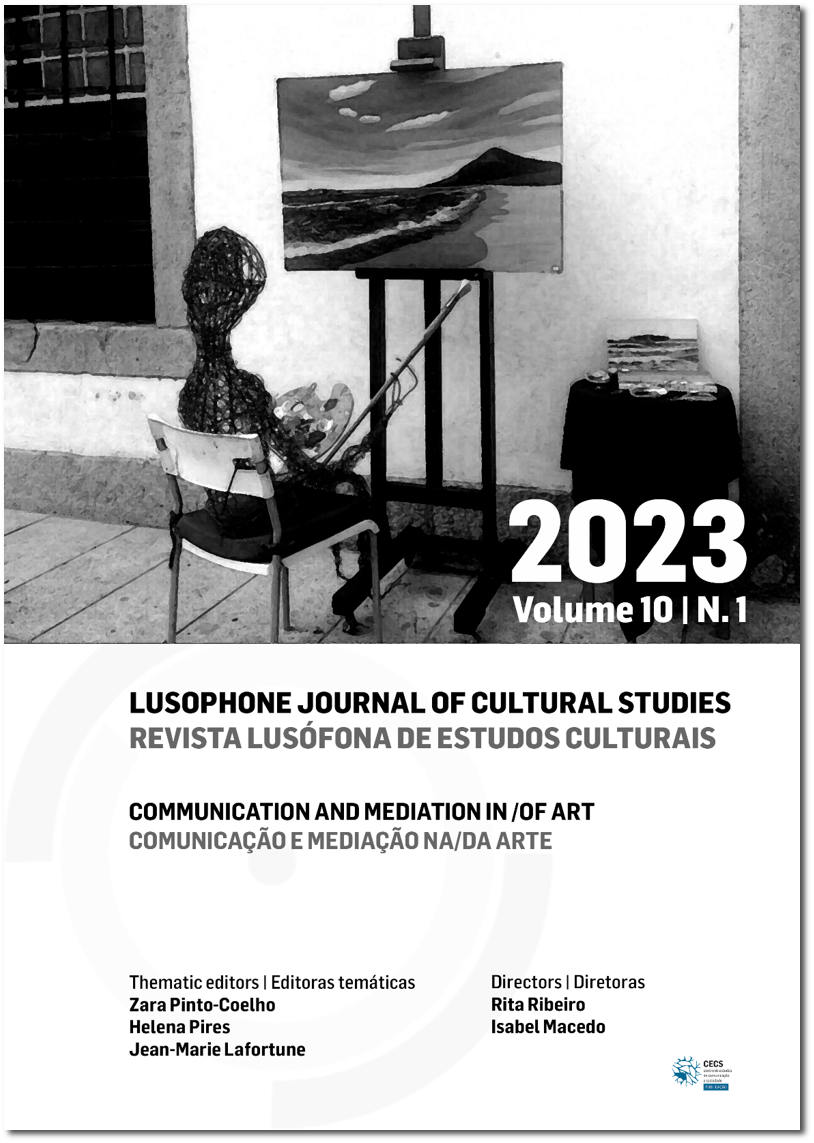Interculturality in the Musical Work of Robert Plant
DOI:
https://doi.org/10.21814/rlec.4140Keywords:
interculturality, Robert Plant, intersectional mainstream, communication, rockAbstract
This scientific essay analyses and discusses the concept of interculturality across the work of the musician Robert Plant, from his early career to the present day. We seek to contribute to what we call the "intersectional mainstream" and to understand the locus of interculturality throughout the singer's 40-year career. Our main question is: what are the musical limits of Plant, who is recognised as one of the greatest rockers of all time and who has always sought dialogue with other musical genres and cultures? To answer this and other questions, we based our text on the theoretical communication assumptions of Muniz Sodré's (2006, 2014), and Néstor García Canclini's (2005) and Homi K. Bhabha's (1998/2014) postcolonial precepts on interculturality. Based on the analysis of Plant's work, we conclude that the musician's challenging approach of dialogues and intersections remains to this day, cyclical and dialectical, the guiding star of the artist, who is not content to be just mainstream, much less a static mainstream, but an artist immersed in cultural dialogues and always willing to transcend market barriers.
Downloads
References
Adorno, T., & Horkheimer, M. (1985). A dialética do esclarecimento (G. A. de Almeida, Trad.). Jorge Zahar. (Trabalho original publicado em 1944)
Bauman, Z. (2008). Vida para consumo. (C. A. Medeiros, Trad.). Jorge Zahar. (Trabalho original publicado em 2007)
Bhabha, H. K. (2014). O local da cultura (M. Ávila, E. Reis, & G. Gonçalves, Trads.). UFMG. (Trabalho original publicado em 1998)
braxfijun. (2011, 15 de julho). Robert Plant - Another Tribe (Mighty Rearranger Album).wmv [Vídeo]. YouTube. https://www.youtube.com/watch?v=iSXakz4by3A
Canclini, N. G. (2005). Diferentes, desiguais e desconectados: Mapas da interculturalidade. UFRJ.
Cardoso Filho, J. (2008). Emergência do sentido na canção midiática: Uma proposta metodológica. InTexto, (18), 47–63. https://seer.ufrgs.br/index.php/intexto/article/view/6730
Chanobass. (2015, 1 de setembro). Calling To You (Robert Plant) [Vídeo]. YouTube. https://www.youtube.com/watch?v=ChgzpvPS9jA
Cruz, F., & Curi, G. O. (2017). O incessante rugido: Robert Plant e o mainstream interseccional. Líbero, (29), 47–58. https://seer.casperlibero.edu.br/index.php/libero/article/view/868
Full Album. (2022, 26 de setembro). Robert Plant - M̲ight̲y Re̲arr̲ange̲r [Full Album] 2005 [Vídeo]. YouTube. https://www.youtube.com/watch?v=LS5-GjPtsyM
Janotti Júnior, J. (2007). Música popular massiva e comunicação: Um universo particular. INTERCOM, 4(2), 1–16.
Janotti Júnior, J., & Cardoso Filho, J. (2006, 6–9 de setembro). A música popular massiva, o mainstream e o underground [Apresentação de comunicação]. XXIX Congresso Brasileiro de Ciências da Comunicação, Brasília, Brasil.
http://www.intercom.org.br/papers/nacionais/2006/resumos/R1409-1.pdf
Led Zeppelin. (2015, 25 de fevereiro). Four Sticks (remaster) [Vídeo]. YouTube. https://www.youtube.com/watch?v=iJp27QMR2KU
Led Zeppelin. (2017, 25 de janeiro). Kashmir (remaster) [Vídeo]. YouTube. https://www.youtube.com/watch?v=tzVJPgCn-Z8
Led Zeppelin (2020, 23 de outubro). Friends (remaster) [Vídeo]. YouTube. https://www.youtube.com/watch?v=fk5lfjNH4cE
Led Zeppelin Timeline. (s.d.). "Led Zeppelin III" released. Retirado a 6 de setembro de 2022 de https://www.ledzeppelin.com/event/october-5-1970
Lemos, J. A. (1993). Led Zeppelin: Toda a história da banda que inventou o heavy metal. Revista Bizz, 13.
Lewis, D. (1991). Led Zeppelin. A celebration. Omnibus Press.
Maul1977. (2010, 23 de janeiro). Most High Jimmy Page, Robert Plant [Vídeo]. YouTube. https://www.youtube.com/watch?v=fZFo78UjZJI
Owen Rnadle. (2016, 31 de janeiro). Led Zeppelin - Led Zeppelin III - That's The Way [Vídeo]. YouTube. https://www.youtube.com/watch?v=8Kif1gDxG3o
Plant, R. (2005). Tin Pan Valley [Música]. On Mighty Rearranger. Es Paranza; Sanctuary.
Plant, R. (2014a, 23 de junho). Robert Plant 'Little Maggie' | Official Track [Vídeo]. YouTube. https://www.youtube.com/watch?v=MlEJeZcvK4g
Plant, R. (2014b, 23 de junho). Robert Plant 'Rainbow' | Official Track [Vídeo]. YouTube. https://www.youtube.com/watch?v=F3L0EUbRJGk
Plant, R. (2016a, 21 de abril). Dancing in heaven [Vídeo]. YouTube. https://www.youtube.com/watch?v=lQbZCP5b4go
Plant, R. (2016b, 21 de abril). The enchanter (2006 remaster) [Vídeo]. YouTube. https://www.youtube.com/watch?v=bxH2WpwJcm0
Plant, R. (2016c, 21 de abril). Slow dancer (2006 remaster) [Vídeo]. YouTube. https://www.youtube.com/watch?v=doj08c62B_o
Plant, R. (2016d, 21 de abril). Takamba (2006 remaster) [Vídeo]. YouTube. https://www.youtube.com/watch?v=Q75fDFRWgW4
Plant, R. (2016e, 21 de abril). Watching you (2006 remaster) [Vídeo]. YouTube. https://www.youtube.com/watch?v=a5cjuzt9MO0
Plant, R. (2016f, 17 de julho). Down to the sea (2006 remaster) [Vídeo]. YouTube. https://www.youtube.com/watch?v=ObOhzrCB5A0
Plant, R. (2016g, 17 de julho). Wreckless love (2006 remaster) [Vídeo]. YouTube. https://www.youtube.com/watch?v=NGPYjalEHZQ
Plant, R. (2017a). New world [Música]. On Carry Fire. Nonesuch/Warner Bros.
Plant, R. (2017b, 13 de outubro). Carving Up the World Again... a wall and not a fence | official audio [Vídeo]. YouTube. https://www.youtube.com/watch?v=jggOLabrpqc
Plant, R. (2017c, 13 de outubro). Carry Fire | official audio [Vídeo]. YouTube. https://www.youtube.com/watch?v=9nNHMu0-jW8
Plant, R. (2017d, 13 de outubro). Robert Plant - New World... | official audio [Vídeo]. YouTube. https://www.youtube.com/watch?v=rHSRC7e1-Fg
Radio Martiko. (2019, 21 de outubro). Om Kalsoum - Laylat Hob أم كلثوم - ليلة حب [Vídeo]. YouTube. https://www.youtube.com/watch?v=hETOm73chLk&t=1140s
Rees, P. (2014). Robert Plant: Uma vida. (E. Assis, Trad.). LeYa. (Trabalho original publicado em 2013)
“Robert Plant conta tudo”. (1988, junho). Revista Bizz, (35), 45–52.
Said, E. W. (2013). O orientalismo. O oriente como invenção do ocidente (R. Eichenberg, Trad.). Companhia de Bolso. (Trabalho original publicado em 1978)
Sodré, M. (2006). As estratégias sensíveis. Afeto, Mídia e Política. Vozes.
Sodré, M. (2014). Ciência do comum: Notas para o método comunicacional. Vozes.
Thomas, G. (2009). Led Zeppelin. The illustrated biography. Transatlantic Press.
Wall, M. (2009). Led Zeppelin: Quando os gigantes caminhavam sobre a terra (E. Serapicos, Trad.). Larousse do Brasil. (Trabalho original publicado em 2008)
Williamson, N. (2011). O guia do Led Zeppelin (H. Szolnoky, Trad.). Aleph. (Trabalho original publicado em 2007)
Wisnik, J. M. (2007). O som e o sentido: Uma outra história das músicas. Companhia das Letras.
Downloads
Published
How to Cite
Issue
Section
License
Copyright (c) 2023 Fábio Cruz, Guilherme Curi

This work is licensed under a Creative Commons Attribution 4.0 International License.
Authors own the copyright, providing the journal with the right of first publication. The work is licensed under a Creative Commons - Atribuição 4.0 Internacional License.








